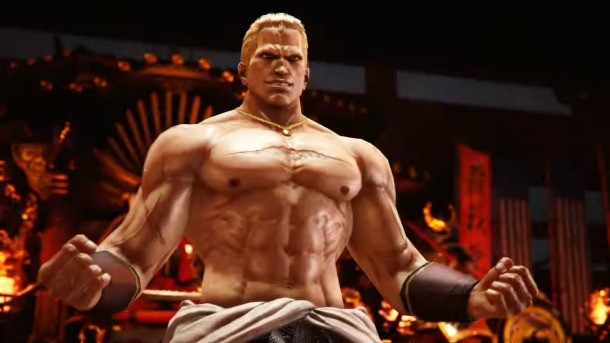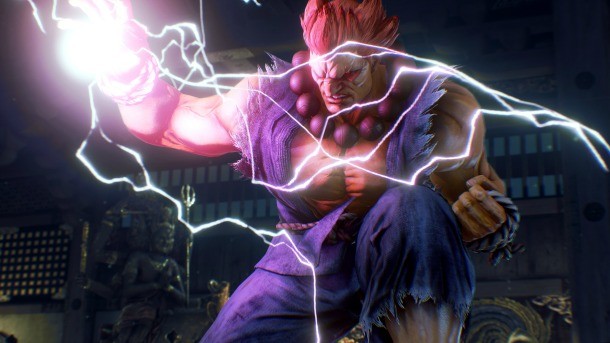Our extra-large special edition is here. Subscribe today and receive the 25% longer issue at no extra cost!
Tekken's Harada On Choosing Upcoming Character Crossovers

Tekken 7 is one of the biggest fighting games this generation. After years in the arcade balancing the roster, the game finally came to home consoles with a story mode in tow this past March. The story of three generations of the Mishima family constantly existing in a state of war was given a new layer with the story of Heihachi Mishima's wife, who sets off the fifty year family feud by trying to kill Heihachi and Kazuya.
The title has sold over two million copies, stomping expectations set by the last few games in the series. At the Tekken World Tour finals in San Francisco, that number was on the lips of everyone I have talked to, because it proved that fighting games weren't dead and Tekken is at the head of the pack. Enthusiasm for Tekken is at an all-time high, which validates the team's years of work on the game.
At EVO 2017, Tekken took the spotlight in a rare announcement, revealing that Geese Howard from the Fatal Fury series would be joining the Tekken 7 cast and fueling speculation over who would be arriving next.
We got to sit down and speak with series head Katushiro Harada ahead of the grand finals and get his thoughts on DLC, how he picks DLC characters, and more. Noctis from Final Fantasy XV was only a few hours away from being announced during the interview, so we unfortunately did not get to ask him about the Prince of Lucius, but we did get a lot of his thoughts on how they pick new characters and collaborations which apply to Noctis.
Tekken 7 is out, there’s Tekken Bowling and Geese Howard, and the next one hasn’t been revealed yet. After the next character, what’s the next step for Tekken 7? Is there another character or is it moving on to a new game?
Well, we first had planned to cover maybe a year after the initial launch of Tekken 7 with this first season of DLC. And then what we can do after that really depends on how well the game is selling, both from an internal corporate atmosphere about being able to create more stuff, and from a fan perspective of how many people are really asking for more Tekken at that point. So from that perspective, you could say that the game has sold quite well so far. We shipped two million, which we announced two months after release, but we actually fulfilled that milestone just a month after release. And the fans, as you can see, are still heavily supporting that game, so from that perspective you could say we’re in a really good place to think about the future.
What’s your DLC philosophy with Tekken? Capcom uses the “Living Game” philosophy with their fighting games with seasons of characters. Would you want to move Tekken to something similar, assuming everything goes well with sales and demand?
It is one possibility to extend the life of the game with more DLC, et cetera. If you look at the market currently, Tekken 7 is doing very well compared to past installments of the game but also compared to other rival franchises. Tekken is in a really good place at the moment.
So there is the possibility of doing more DLC, but there’s also a few other possibilities, as well. It’s something that our marketing team is thinking of, which direction we want to take as a company.

Geese Howard was announced at EVO. Why Geese specifically? A lot of people were surprised at how well Akuma fit into the game, but why Geese over, say, Terry or Rugal or other Fatal Fury characters?
It was kind of a different circumstance from Akuma. The decision making occurred outside of Tekken 7 and outside of initial planning. Mainly, it was being interviewed by different media outlets and often they’d ask what character we would put in the game if we could choose anyone. Often, [Geese] was our go-to answer, and it just kind of clicked on our level. He’s a bad guy in this major franchise and he’s just got this sort of… atmosphere about him that makes him feel natural in the game.
Then after the initial interviews and the response, SNK actually came up to us and said hey, we’re interested in making Geese happen in Tekken. Collaborations can be very difficult, because even if you have a great idea for a character and want to make it happen, it could be that the original licensor doesn’t sign off on it for a variety of reasons. Either it doesn’t work for them, or maybe there’s a certain timing with their business plan for that character that doesn’t line up, there’s so many instances where it's not entirely possible.
And then you also have to think about the audience. For example, Geese is more of a hardcore character, and there’s a lot of overlap with current Tekken fans. But a lot of times, you have to think, does this character… not only does he fit in the game, but does he broaden the current audience if we incorporate this into the game? So even if the atmosphere of the character fits well with the game, it might be from a marketing standpoint that it is the same number of Tekken fans, so you might not get as many new players. Not necessarily from that franchise, but from gamers as a whole. There’s a lot to think about when deciding on characters.
Tekken has always had that cross-media reach when it comes to characters. There was Gon in Tekken 3, there was Lars who was designed by [Naruto creator] Kishimoto, what do you do to make sure Tekken still retains its identity even with all that cross-media collaboration?
Tekken has always had a lot of variety to it, which probably comes from its various influences from manga and anime and some of the games that have inspired the series throughout its creation. It’s not like there’s a very narrow definition of Tekken that the team follows, they’re actually quite open to new ideas.
The reason for including these collaborations is actually to bring in people who maybe wouldn’t give Tekken a try. If you look at the strictly hardcore players, some of the collaborations we do might not seem very Tekken-like to them, but because of the attention to detail and how it’s built, just like any other component of Tekken, when people pick it up and try it out, they think “Hey, this is actually a lot better than I thought!” or “This doesn’t feel out of place.”
Tekken 7 was the first game in the series to have a story mode quite like this one, do you feel it came out as successfully as you hoped?
Tekken’s actually had a lot of story elements to it throughout the franchise. It was probably one of the first fighting games to have the opening cinematic that kind of presents the first part of the story, then as you clear the arcade mode with each character, you got a CG movie that shows you how the story progressed for each character, and that was at the start. We’ve kind of changed the way we’ve tried to implement story elements in the series after that, except for [Tekken Tag Tournament] titles which are kind of a spinoff or different entity.
But the story mode this time is just an evolution of all that. Looking at how people play the game, when we were initially thinking of doing the story mode, we kind of knew who are audience were and that they were quite varied in what they were enjoying about the game. We tailored the story mode to a certain group of people and it seems like, from the way people are more easily picking up the game with Tekken 7 according to how well it’s doing, then we think we’ve done a fairly decent job of accomplishing what we want to do with that mode.

This is a story-related question, but who do you see as the heroes and villains in the Tekken universe now? Jin has done some bad things, Heihachi’s motivations have become more sympathetic, is there any more good and bad in the Tekken universe?
Well, that’s a tough question, because most of the people in the Tekken storyline are bad people. Sometimes, Jin may seem like a hero, but other times he is responsible for causing wars, so it’s all a grey area there.
A lot of people like to think that the world is ruled by law and reason, but in actuality, it’s all about power, like Kazuya’s famous line. There’s different types of power, whether it’s authority, or financial power, or whether it’s actually the power of your weapons and stockade, there’s many types of power. That’s kind of the story of Tekken and it’s shown as the certain reality of people themselves rather than the idea law and order.
At the end of Tekken 7’s story mode, you don’t get to see who the final hit between Akuma and Kazuya favors. Can you answer that right now?
The result hasn’t happened yet. It’s still a work in progress.
Is it something we’ll find out one day?
I’ve thought of many different paths and possible outcomes for the battle, but it’s quite scary. For example, if Kazuya were to kill off Akuma in our storyline, maybe I and [Street Fighter producer Yoshinori Ono] would be disappeared by [Capcom chief operating officer] Tsujimoto, so that would not be good for us.

Get the Game Informer Print Edition!
Explore your favorite games in premium print format, delivered to your door.
- 10 issues per year
- Only $4.80 per issue
- Full digital magazine archive access
- Since 1991







